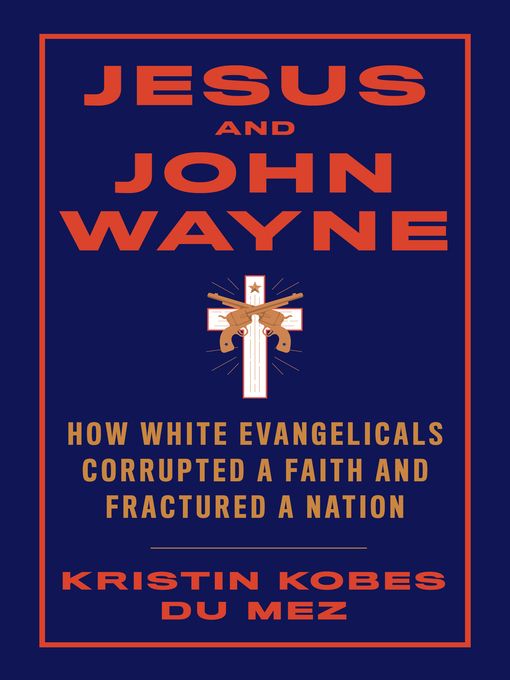
Jesus and John Wayne
How White Evangelicals Corrupted a Faith and Fractured a Nation
کتاب های مرتبط
- اطلاعات
- نقد و بررسی
- دیدگاه کاربران
نقد و بررسی

April 1, 2020
Historian Du Mez (history, Calvin Univ.; A New Gospel for Women) offers an insightful examination of white Christian masculinities from the era of Billy Graham and John Wayne to Mark Driscoll and Donald Trump. In response to mid-20th century social movements that challenged white supremacy, patriarchal authority, and American imperialism, Du Mez argues, conservative white evangelicals wholeheartedly embraced the figure of a heroic white man who defended America as a (conservative evangelical) Christian nation against a wide range of perceived internal and external threats, from secular humanism, feminism, and communism to antiwar activists, immigrants, and the Islamic world. While approved scripts for white Christian manhood since the 1960s have always been multiple, they have nevertheless all required a commitment to fervent nationalism, aggressive militarism, and an uncompromising view of gender that is both essentialist and complementarian. Du Mez covers a lot of cultural ground and at times the narrative feels rushed; readers unfamiliar with the many different movements will likely finish with a list of topics for further investigation. VERDICT This timely exploration helps readers place President Trump and his supporters in the context of white Christian America's reaction to mid-20th-century social justice activism.--Anna J. Clutterbuck-Cook, Massachusetts Historical Soc., Boston
Copyright 2020 Library Journal, LLC Used with permission.

April 1, 2020
Masculinity and militarism in the evangelical movement. History professor Du Mez traces the roles of gender, race, and nationalism through the modern history of the Christian evangelical movement, from the rise of Billy Graham to the election of Donald Trump. "For conservative white evangelicals," writes the author, "the 'good news' of the Christian Gospel has become inextricably linked to a staunch commitment to patriarchal authority, gender difference, and Christian nationalism, and all of these are intertwined with white racial identity." Faced with the prospect of communism as early as the late 1940s, white evangelicals began espousing a masculinized, even militarized version of Christianity. This trend made heroes out of particularly masculine religious leaders such as Graham as well as outspoken personalities like actor John Wayne. "Through his films and his politics," Du Mez writes, "Wayne established himself as the embodiment of rugged, all-American masculinity," and his "masculinity was unapologetically imperialist." Reacting to societal unrest and rebellion, conservatives such as psychologist James Dobson, founder of Focus on the Family, advocated for strict discipline of children and patriarchal control of the home through the 1970s and '80s. With the end of the Cold War, evangelicals turned their attentions to moral issues, fighting liberalism through such mouthpieces as Rush Limbaugh and Bill O'Reilly. After 9/11, evangelicals turned their attention to militant Islam, invigorating the movement because "militant evangelicalism was always at its strongest with a clear enemy to fight." Barack Obama also provided evangelicals with fodder for activism. "Trump," writes Du Mez, is "a man whose rugged masculinity was forged in 1950s America, a time when all was right with the world," and he became "the culmination of [evangelicals'] half-century-long pursuit of a militant Christian masculinity." Despite a few moments of overt subjectivity, the well-researched narrative is reasoned and dispassionate. While the author often paints with a broad brush, characterizing white evangelicals throughout as racist, hypernationalistic, and utterly patriarchal, readers not on the fringe right will find it difficult to take issue with her arguments. An evangelical-focused anti-Trump book that carries academic weight.
COPYRIGHT(2020) Kirkus Reviews, ALL RIGHTS RESERVED.

April 6, 2020
Historian Du Mez (A New Gospel for Women) explains white evangelical support for Trump in this engaging history of the shifting ideal of Christian masculinity. Starting in the early 20th century, white Christian men followed charismatic preachers in striving for a muscular, militant masculinity. For Du Mez, the growth of Christian publishing and popular culture in the mid-century reinforced the sense that evangelicals were at war with liberal social movements like feminism and civil rights. 9/11, she argues, revitalized the extreme warrior ideal for evangelical men and curtailed the softer patriarchy fostered by the Promise Keeper rallies of the 1990s. The recent growth of homeschooling and Quiverfull (child-centric evangelical theology) and evangelicals’ suspicion of Obama are also explored. Persuasively arguing that the evangelical dismissal of Trump’s flaws is the culmination of believing that “God-given testosterone came with certain side effects,” Du Mez closes with a bruising chapter on recent evangelical leaders’ abuses and sex scandals, such as those involving Mark Driscoll, Ted Haggard, and C.J. Mahaney. This lucid, potent history adds a much needed religious dimension to understanding the current American right and the rise of Trump.

May 15, 2020
In the 2016 presidential election, 81 percent of Evangelical Christian voted for Donald Trump, whose views and actions seem antithetical to theirs. The question of how this could have happened is explored by historian Du Mez in this fascinating study of the rise of militant masculinity among Evangelicals, an ideology, she asserts, that enshrines patriarchal authority and condones the callous display of power at home and abroad. The author charts the evolution of this attitude through such avatars of masculinity as Billy Graham, Barry Goldwater, Oliver North, Mel Gibson, and, finally, Trump himself, perceived by Evangelicals as a real man, a man whose rugged masculinity was forged in 1950s America. In this view, Trump becomes, in short, the reincarnation of John Wayne, the heroic masculine protector, the embodiment of the myth of the American cowboy. The movies were only part of a widespread Evangelical culture that helped shape these attitudes and beliefs that, today, have turned Jesus into a "badass." Sure to be controversial, the author's closely reasoned argument is thoughtful and thought provoking.(Reprinted with permission of Booklist, copyright 2020, American Library Association.)

























دیدگاه کاربران